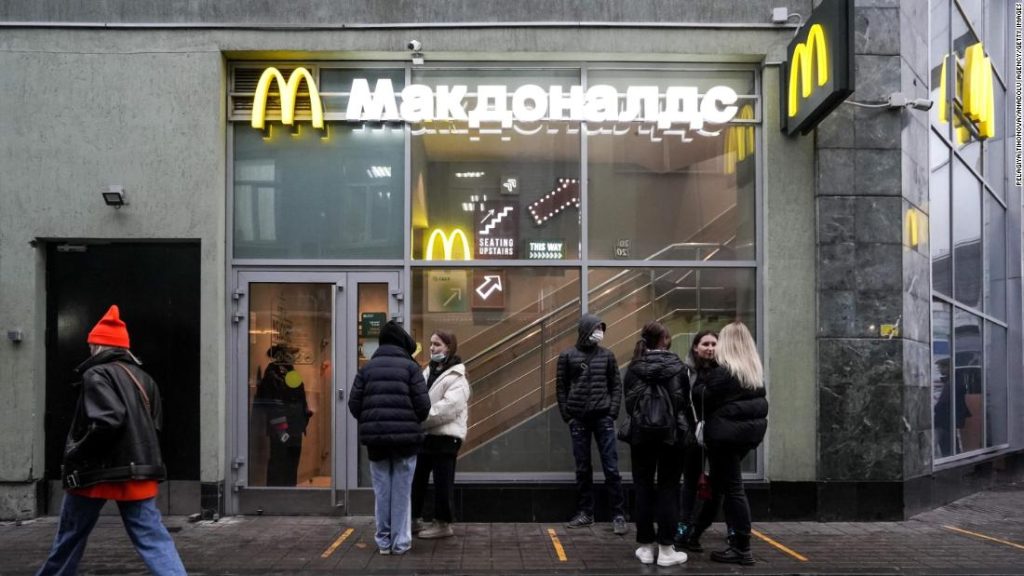“McDonald’s has decided to temporarily close all of our restaurants in Russia and temporarily stop all operations in the market,” McDonald’s CEO Chris Kempczynski said in a statement on Tuesday.
According to an investor document, there were 847 McDonald’s locations in Russia at the end of last year.
“In Russia, we employ 62,000 people who have poured their hearts and souls into our McDonald’s brand to serve their communities. We work with hundreds of local and Russian suppliers and partners who produce food for our menu and support our brand,” said Kempzinski. . “We serve millions of Russian customers daily who depend on McDonald’s. In the 30 years that McDonald’s has operated in Russia, we have become an essential part of the 850 communities in which we operate.”
But, he added, “At the same time, our values mean that we cannot ignore the needless human suffering unfolding in Ukraine.”
However, some big players in the food business continue to sell their products in the country.
Critics of Russia’s actions are pressing some of these brands to withdraw from the country.
But there are a number of reasons why food companies stay in Russia while many others are turning their backs. The supply chain can be more complex for food sellers than for other industries. Many restaurant chains are run by franchisees, giving business owners less control. Beverage makers, such as Coca-Cola, rely on bottlers and regional distributors to sell their products.
Food companies in Russia
Coca-Cola HBC and Coca-Cola did not respond to requests for comment on their operations in Russia, but a statement from Bogdanovich appeared on his company’s website.
“Our thoughts are with all those affected, and we are doing everything we can to support our people, their families and humanitarian relief efforts in Ukraine and the region,” he wrote, adding that along with Coca-Cola, his company has donated 1 million euros to the Ukraine Red Cross, and is providing more support to neighboring countries and Ukrainian staff.
However, the letter did not mention Russia or how the company is going there.
Some people have strong opinions about how these companies should proceed.
Twitter users use #boycottCoke and #boycottPepsi due to the companies’ operations in Russia.
McDonald’s also came under heavy criticism ahead of its announcement on Tuesday. Twitter users posted messages with #boycottMcDonalds, and the company was summoned by New York State Comptroller Thomas Dianapoli.
Prior to McDonald’s announcement, Dinapoli sent an email to a number of companies represented in the New York State mutual pension fund, including PepsiCo and McDonald’s, urging them to stop doing business with Russia.
“Companies such as McDonald’s and PepsiCo, which have a large footprint in Russia, should consider whether doing business in Russia is worth the risk during this extraordinarily turbulent time,” Dinapoli said in a statement.
Danone and the day they stay where they are
The company has detailed its plan for Russia.
“We have decided to suspend all investment projects in Russia, but we are currently maintaining the production and distribution of fresh dairy products and infant nutrition, to meet the basic nutritional needs of the local population,” the company said.
The company also said that “this war could continue for a long time. If so, it will lead to increased difficulties for the affected population in obtaining basic commodities.”
But the company indicated that it had stopped importing its products to Russia and stopping all investments in the country, in addition to stopping exports from there. She will not benefit from her presence in Russia.
The company added that it would “redirect all profits from operations in Russia to humanitarian efforts,” as well as a donation to the Red Cross through the Yum Brands Foundation. Yum has about 1,000 KFC restaurants and 50 Pizza Hut locations in Russia. Most of these companies are run by independent owners, the company said.
Pharrell Bertman, a registered dietitian and senior lecturer in the University of Vermont’s Department of Nutrition and Food Sciences, warned that if major food companies left Russia, citizens could suffer, even if they had other sources of food.
“I feel very strongly that people should be given the opportunity to buy a variety of foods at different prices,” she said. “It can only be done successfully if access is there.”
Bertman noted that Coca-Cola and Pepsi make more than just sugary soft drinks.
Coca-Cola sells water, juice, milk, and other beverages. PepsiCo makes a number of non-carbonated drinks, and owns Quaker oats and snacks as well as other food brands.
“Ultimately, foods have to be provided,” she said. ‘I would be very concerned if the food environment [were] for a drastic change.”
CNN’s Robert North contributed to this report.

“Extreme travel lover. Bacon fanatic. Troublemaker. Introvert. Passionate music fanatic.”







More Stories
Best National Burger Day Deals 2024
Trump attacks Fed for ‘playing politics’ with historic rate cut
Tesla “Magnificent Seven” (TSLA) shares report third-quarter earnings this week. Is it a buy before the results?